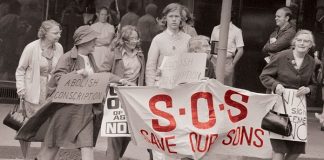Hell No! We Won’t Go! by Bobbie Oliver is an interesting addition to the Vietnam War literature, centring the experiences of draft resisters.
Oliver’s book starts with the introduction of the National Service Act by the Robert Menzies government in 1951, in the midst of his campaign to ban the Communist Party, and during the rise of communist insurgencies around Southeast Asia and the start of the Korean War.
The Act required all men turning 18 to serve six months of military training unless they applied for an exemption as a conscientious objector.
A clear majority of conscientious objectors were driven by Christian religious convictions, showing how anti-war sentiment at the time was marginalised by the fear of communism.
Oliver documents how various peace activists kept the flame of their movement alive in this period of reaction by linking general critiques of the militarist system with activity supporting the victims of this militarist system—the conscientious objectors who were arbitrarily rejected for an exemption and endured brutal humiliating treatment in military prisons.
The Menzies government repealed the National Service Act in 1959 as advances in military technology made the need for a large standing army largely redundant. However, the lack of resistance Menzies had faced meant he felt emboldened to reintroduce the National Service Act in 1964 to prepare for entry into the Vietnam War.
This version of the Act required all 20-year-old men to register for the draft ballot. Dates were drawn and men with corresponding birthdays were called up for national service.
The turning point came in 1966 when Prime Minister Harold Holt, who had succeeded Menzies, announced that national servicemen would be sent to Vietnam to fight in units of the Australian regular army.
This gave the impetus for eligible draftees to begin to speak out publicly against the National Service Act itself rather than applying for exemptions under its provisions. It was an attempt to not just oppose conscription but to wreck it.
At the same time campaigns of mass civil disobedience and arrests erupted, inspired by the anti-war movement in the US. Draft resistance safe havens began to form in university student unions, which helped shelter students who wanted to avoid the draft.
Trainee teacher
By the end of 1970, only 1007 out of 11,500 draft resisters had been prosecuted, showing the impact of the protests and resistance in emboldening “quiet” draft resisters.
However, the lack of prosecutions posed a dilemma for draft activists who believed that the jails needed to fill with resisters to escalate the opposition to the war. Oliver traces the depressing reality of prison sentences, perhaps to show the naivety of such strategy.
Resistance to the draft did not just come from students but also from workers. A particularly important case was that of a trainee teacher by the name of Bill White, who in 1966 was sacked for refusing to comply with the draft.
The National Service Act fined employers who continued to employ a person who was refusing to enlist. Bill’s case was a direct challenge to this part of the Act, as parents, teachers and other supporters coalesced in support around him.
Bill’s case strengthened the resolve of the Labor Party led by Arthur Calwell to oppose the war and conscription and started a vigorous debate inside the unions in regard to taking a position on the Vietnam War and conscription.
The rising opposition to the Vietnam war and the National Service Act culminated in union and Labor Party involvement in the first of three Vietnam War moratorium marches.
The demonstrations were by far the largest in Melbourne, where workers, recently emboldened by the defeat of the anti-union penal powers in the previous year, walked off the job to attend a protest against the war on 8 May 1970, and twice more over the next year.
The greatest strength and weakness of Oliver’s book is that it chooses to show not tell—Oliver does not tell the reader what public opinion was at the time but shows it by recounting the details of court cases, newspaper articles and the numbers of protesters. The book is heavily weighted towards draft resistance in Western Australia.
While the advantage of this approach is that it provides a dose of balance to ideologically tinged recounting of the history of the protests against the Vietnam War, it does make it harder for the uninitiated reader to draw meaningful conclusions from these passages.
We can draw inspiration and a dose of realistic expectations from the early resisters and peace activists. Like them, socialists today are isolated by the gung ho attitudes towards the war in Ukraine and Australia’s military build-up against China.
Oliver’s book shows, however, how small acts of resistance can feed into a general revolt against war.
By Steven Kwon
Hell No! We Won’t Go! Resistance to Conscription in Postwar Australia
By Bobbie Oliver
Interventions, $35





